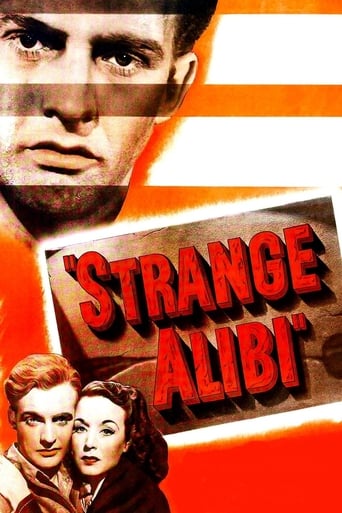MartinHafer
When the film begins, an informer is about to turn evidence on the mob. Soon, however, he is murdered and the cops catch the man responsible. But, the murderer is found hung in his cell--and the leads as to who is in charge of the mob have all dried up.The scapegoat for this 'accidental suicide' is Sgt. Joe Geary (Arthur Kennedy). When he's confronted for this, Geary shows he's a hot-head and slugs his superior--and is thrown off the police force for insubordination. However, in one of the oldest plot devices known to gangster films, it turns out Geary has done this in order to work undercover for the police Chief. And, in the second oldest plot device known to gangster films, the Chief is killed--and no one can prove that Geary is working undercover as the Chief neglected to leave any evidence to this effect (oops!). Even worse, Geary is assumed to be guilty for the killing and is sentenced to life in prison. What is next for the mug? See the film.The big plot hole is that anyone would go this far undercover and not have some sort of backup plan for if the ONLY one who knows he's undercover dies! This is pretty silly, though fortunately the film, despite some clichés, is pretty exciting. Much of it is that Warner Brothers had a real knack for these sort of films--even if it only had a B-movie budget like "Strange Alibi". Worth seeing even if the plot is less than brilliant because it is fast-paced, exciting and slickly produced.
bkoganbing
Arthur Kennedy stars in this film from Warner Brothers B picture unit where he plays a cop gone undercover to get the goods on a gambling syndicate. What he doesn't know is that the top cop brass Stanley Andrews and Cliff Clark are the head of the syndicate. After testifying in court Kennedy's framed for murder and sent to prison.What a predicament, to the crooks he's a stool pigeon and he's now a criminal as well.In only 63 minutes running time this B film goes at a rapid pace as Kennedy works out a situation that even Franz Kafka couldn't conceive.Some mighty good performances characterize this film besides those mentioned. Florence Bates as the owner of a lakeside roadhouse, Howard DaSilva as a sadistic prison guard, Jonathan Hale as the governor, and John Ridgely as one of the few convict friends Kennedy makes in the joint.There's a slam bang chicken run with a freight train during Kennedy's prison break. And his gimmick for clearing himself with the governor, absolutely inspired.Good product from the Brothers Warner.
fredcdobbs5
Arthur Kennedy is a police sergeant who goes undercover to root out crooked cops, only to get framed by those very cops for the murder of the police chief he was working for, and winds up being sent to prison. Kennedy, in an early role, is quite good and the film is chock full of the great character actors that pop up in these neat old Warners "B"s--guys like Jonathan Hale, Dick Rich, John Ridgely, Ben Welden and, in a scene-stealing role, Howard Da Silva as a sadistic prison guard. Director D. Ross Lederman, an old hand at these kinds of pictures, keeps things moving at lightning speed, and it has the sneering thugs, tough cops, gun molls with a heart of gold, screaming sirens, screeching tires, breakneck car chases and everything else that made so many of the Warners "B" pictures of the '40s worthwhile. Check it out.
bmacv
Strange Alibi harks back to the quick, crude Warners crime-and-corruption movies of the 1930s, showing none of the more nuanced, ambiguous style that started to coalesce in the early 40s. It's a rough and ready programmer, just watchable because of a few of its cast members.Arthur Kennedy, in one of his earliest roles, plays a cop who stages a dishonorable discharge from the force in order to work the shady side of the street. But, framed for the murder of the one man who can vouch for his honesty, he ends up in the Big House, a target both of other cons (since he was a cop) and the guards (since they think he was a dishonest one; Howard Da Silva plays a particularly sadistic screw). He's in for life, which promises to be nasty, brutish and short, but a few fast friends on the outside are trying to get him exonerated. Chief among them is gold-hearted vice queen Florence Bates, one of the movies' most formidable old battleaxes (before taking to acting, she was the first woman to practice law in Texas).The plot races and bumps along but manages to work itself out with passable cleverness: Kennedy contrives a scheme in which his innocence is proved by the "testimony" of a corpse.



